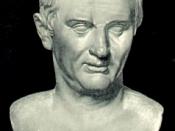The meaning of Roman citizenship in ancient Rome lies in the following readings: Plutarch's Life of Tiberius Gracchus and Life of Cicero; Cicero's On Moral Obligation; and Suetonius' The Life of Augustus.
In Plutarch's Life of Tiberius Gracchus, Plutarch places a lot of emphases on the fact that Tiberius' father held the position of consul twice, even though many were extremely lucky to hold the position once. The fact that many young Romans were encouraged to and aspired to precede their fathers in accomplishments allows us to understand just how much was to be expected of Tiberius Gracchus. Plutarch then goes on to explain that many people saw Tiberius as a young man with a lot of potential rather than a young man surviving off his family's name and previous accomplishments. Plutarch portrays the same idea in the Life of Cicero, "he was ambitious by nature and he was much encouraged by his father."(
Plutarch, Life of Cicero, 127) This illustrates that to be a roman citizen one must rely on themselves to be successful. This is similar to today's society where most individuals mainly depend on themselves after a certain age.
In Cicero's On Moral Obligation Cicero states a roman citizen's duty as "to look after his own estate and not contravene the laws, customs or traditions of his country. Moreover, we should seek riches not only for ourselves, but for our children, relations, friends, and above all, the state." (Cicero, On Moral Obligation, 151) This is a great representation of what it means to be a Roman citizen. It shows that the state was above all, even one's own family. The Romans understood that it was their obligation to withhold the laws of the state no matter what. This is somewhat different nowadays where the right thing to do according to Cicero is to put the state first but most people would put their family before the state even if it is unlawful.
In Suetonius' The Life of Augustus, Augustus is described as a loyal Roman whose utmost duty was to avenge Caesar and keep his decrees in force. He was a perfect example of a Roman citizen. Maybe even too perfect, "Augustus took vengeance on crowds of prisoners and returned the same answer to all who sued for pardon or tried to explain their presence among the rebels."(Suetonius, Life of Augustus, 165) He took his loyalty too far and unjustly killed many people.
Between all four of these readings we get a good idea of what Roman citizenship is. Plutarch, Cicero, and Suetonius describe how Roman citizens must provide for themselves on their own, put the state before all, and uphold the Roman laws.







